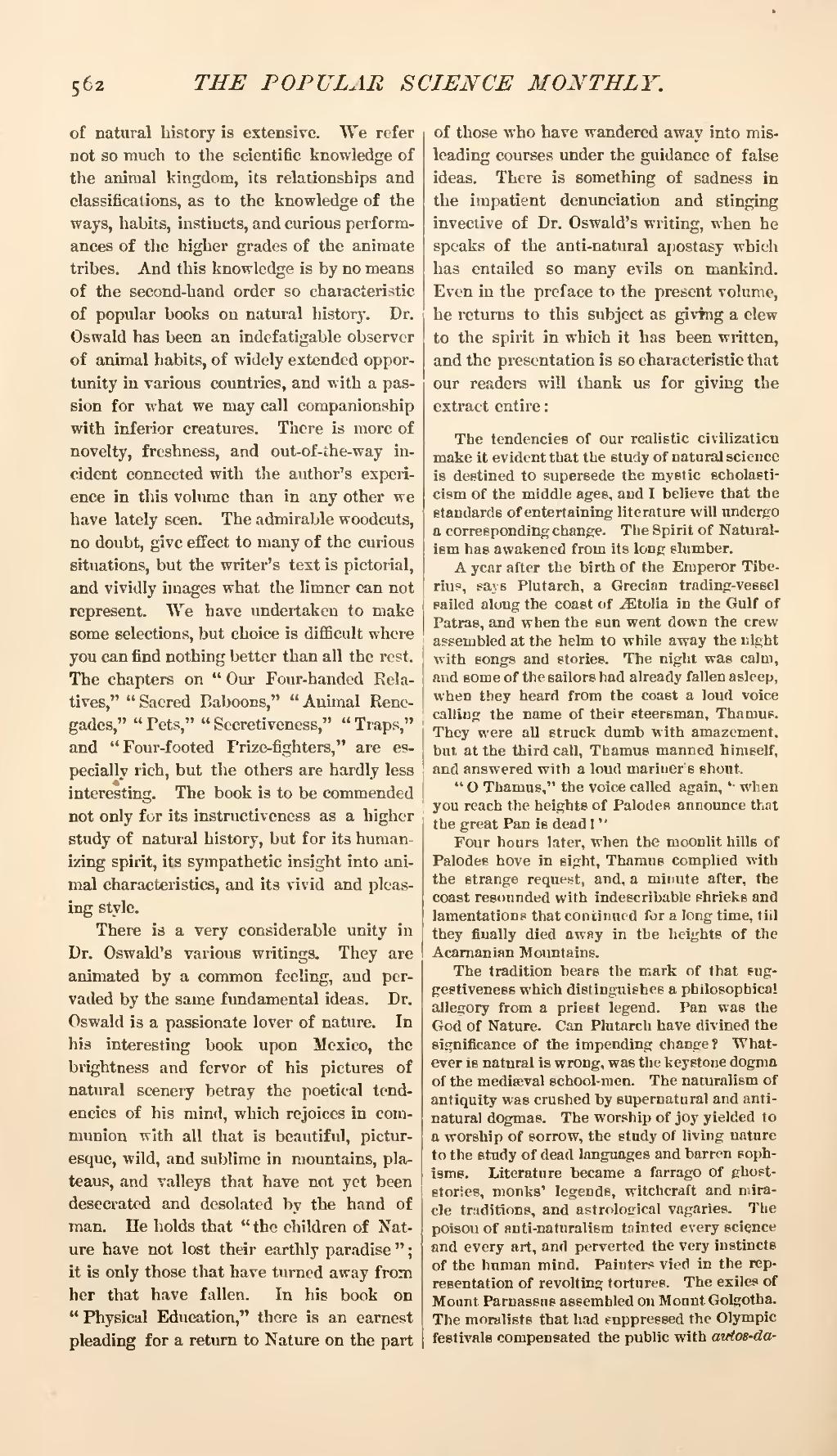of natural history is extensive. We refer not so much to the scientific knowledge of the animal kingdom, its relationships and classifications, as to the knowledge of the ways, habits, instincts, and curious performances of the higher grades of the animate tribes. And this knowledge is by no means of the second-hand order so characteristic of popular books on natural history. Dr. Oswald has been an indefatigable observer of animal habits, of widely extended opportunity in various countries, and with a passion for what we may call companionship with inferior creatures. There is more of novelty, freshness, and out-of-the-way incident connected with the author's experience in this volume than in any other we have lately seen. The admirable woodcuts, no doubt, give effect to many of the curious situations, but the writer's text is pictorial, and vividly images what the limner can not represent. We have undertaken to make some selections, but choice is difficult where you can find nothing better than all the rest. The chapters on "Our Four-handed Relatives," "Sacred Baboons," "Animal Renegades," "Pets," "Secretiveness," "Traps," and "Four-footed Prize-fighters," are especially rich, but the others are hardly less interesting. The book is to be commended not only for its instructiveness as a higher study of natural history, but for its humanizing spirit, its sympathetic insight into animal characteristics, and its vivid and pleasing style.
There is a very considerable unity in Dr. Oswald's various writings. They are animated by a common feeling, and pervaded by the same fundamental ideas. Dr. Oswald is a passionate lover of nature. In his interesting book upon Mexico, the brightness and fervor of his pictures of natural scenery betray the poetical tendencies of his mind, which rejoices in communion with all that is beautiful, picturesque, wild, and sublime in mountains, plateaus, and valleys that have not yet been desecrated and desolated by the hand of man. He holds that "the children of Nature have not lost their earthly paradise"; it is only those that have turned away from her that have fallen. In his book on "Physical Education," there is an earnest pleading for a return to Nature on the part of those who have wandered away into misleading courses under the guidance of false ideas. There is something of sadness in the impatient denunciation and stinging invective of Dr. Oswald's writing, when he speaks of the anti-natural apostasy which has entailed so many evils on mankind. Even in the preface to the present volume, he returns to this subject as giving a clew to the spirit in which it has been written, and the presentation is so characteristic that our readers will thank us for giving the extract entire:
A year after the birth of the Emperor Tiberius, says Plutarch, a Grecian trading-vessel sailed along the coast of Ætolia. in the Gulf of Patras, and when the sun went down the crew assembled at the helm to while away the night with songs and stories. The night was calm, and some of the sailors had already fallen asleep, when they heard from the coast a loud voice calling the name of their steersman, Thamus. They were all struck dumb with amazement, but, at the third call, Thamus manned himself, and answered with a loud mariner's shout.
"O Thamus," the voice called again, "when you reach the heights of Palodes announce that the great Pan is dead!"
Four hours later, when the moonlit hills of Palodes hove in sight, Thamus complied with the strange request, and, a minute after, the coast resounded with indescribable shrieks and lamentations that continued for a long time, till they finally died away in the heights of the Acarnanian Mountains.
The tradition bears the mark of that suggestiveness which distinguishes a philosophical allegory from a priest legend. Pan was the God of Nature. Can Plutarch have divined the significance of the impending change? Whatever is natural is wrong, was the keystone dogma of the mediæval school-men. The naturalism of antiquity was crushed by supernatural and anti-natural dogmas. The worship of joy yielded to a worship of sorrow, the study of living nature to the study of dead languages and barren sophisms. Literature became a farrago of ghost stories, monks' legends, witchcraft and miracle traditions, and astrological vagaries. The poison of anti-naturalism tainted every science and every art, and perverted the very instincts of the human mind. Painters vied in the representation of revolting tortures. The exiles of Mount Parnassus assembled on Mount Golgotha. The moralists that had suppressed the Olympic festivals compensated the public with autos-da-fé
